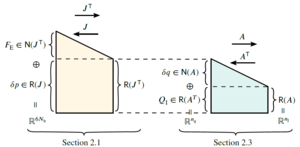Structured learning of rigid-body dynamics: A survey and unified view from a robotics perspective
2021
Article
ics
Accurate models of mechanical system dynamics are often critical for model-based control and reinforcement learning. Fully data-driven dynamics models promise to ease the process of modeling and analysis, but require considerable amounts of data for training and often do not generalize well to unseen parts of the state space. Combining data-driven modeling with prior analytical knowledge is an attractive alternative as the inclusion of structural knowledge into a regression model improves the model's data efficiency and physical integrity. In this article, we survey supervised regression models that combine rigid-body mechanics with data-driven modeling techniques. We analyze the different latent functions (such as kinetic energy or dissipative forces) and operators (such as differential operators and projection matrices) underlying common descriptions of rigid-body mechanics. Based on this analysis, we provide a unified view on the combination of data-driven regression models, such as neural networks and Gaussian processes, with analytical model priors. Furthermore, we review and discuss key techniques for designing structured models such as automatic differentiation.
| Author(s): | Geist, A. René and Trimpe, Sebastian |
| Journal: | GAMM-Mitteilungen |
| Volume: | 44 |
| Number (issue): | 2 |
| Pages: | e202100009 |
| Year: | 2021 |
| Series: | Special Issue: Scientific Machine Learning |
| Department(s): | Intelligent Control Systems |
| Bibtex Type: | Article (article) |
| Paper Type: | Journal |
| DOI: | 10.1002/gamm.202100009 |
| State: | Published |
|
BibTex @article{geist2021structured,
title = {Structured learning of rigid-body dynamics: A survey and unified view from a robotics perspective},
author = {Geist, A. René and Trimpe, Sebastian},
journal = {GAMM-Mitteilungen},
volume = {44},
number = {2},
pages = {e202100009},
series = {Special Issue: Scientific Machine Learning},
year = {2021},
doi = {10.1002/gamm.202100009}
}
|
|



